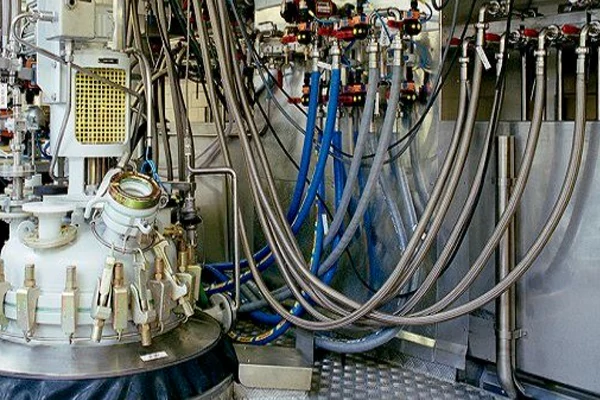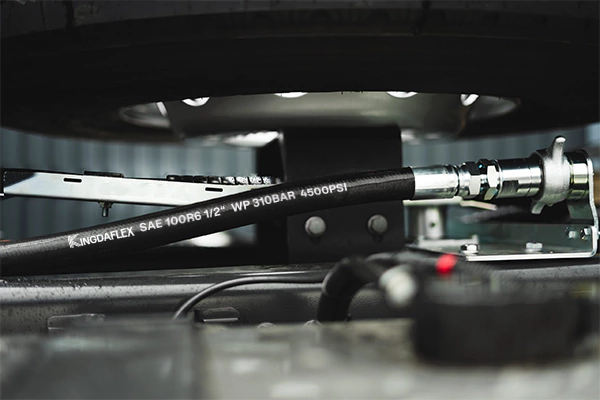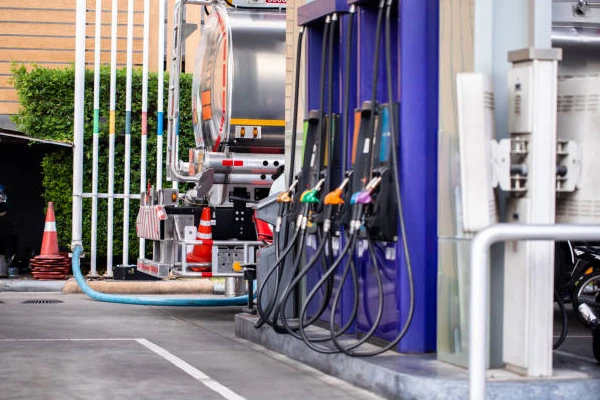Choosing the right washer hose is essential for maintaining your washing machine’s performance and preventing leaks or damage. Rubber and stainless steel hoses are the most common options, each offering unique benefits. Understanding their differences helps you make an informed decision that ensures durability, safety, and reliable water flow in your home.
Rubber hoses are flexible, lightweight, and easy to install, while stainless steel hoses are stronger, more durable, and resistant to kinks and corrosion. By comparing their material properties, lifespan, and cost-effectiveness, you can select a hose that suits your washing machine setup and reduces maintenance needs over time.
What are Rubber Washer Hoses?
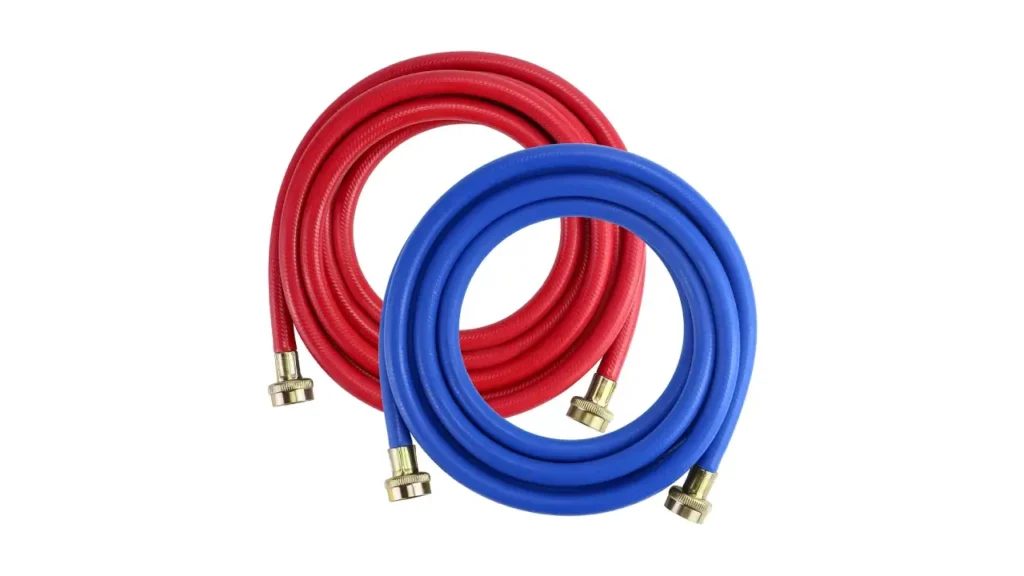
Rubber washer hoses are flexible hoses designed to connect washing machines to water supply lines. Made from high-quality rubber, they provide reliable water flow while preventing leaks, kinks, and damage. Their flexibility and durability make them suitable for everyday household use, ensuring safe and efficient operation.
- Flexible and Easy to Install – Rubber washer hoses are lightweight and highly flexible. We design them to bend easily around tight spaces, making installation straightforward without requiring special tools, ensuring users can connect their washing machines quickly and securely.
- Durable and Leak-Resistant – Rubber hoses are resistant to cracking, splitting, and water leaks. We use premium rubber compounds that maintain elasticity over time, providing a reliable water connection that reduces the risk of flooding or damage to your laundry area.
- Cost-Effective Solution – Rubber washer hoses are generally more affordable than stainless steel alternatives. We offer high-quality hoses that balance performance and budget, making them an ideal choice for everyday household use without compromising reliability.
- Suitable for Standard Water Pressure – Rubber hoses are designed to handle typical household water pressure safely. We manufacture hoses that maintain consistent performance, preventing bursts or leaks, while ensuring safe water flow to your washing machine.
What are Stainless Steel Washer Hoses?
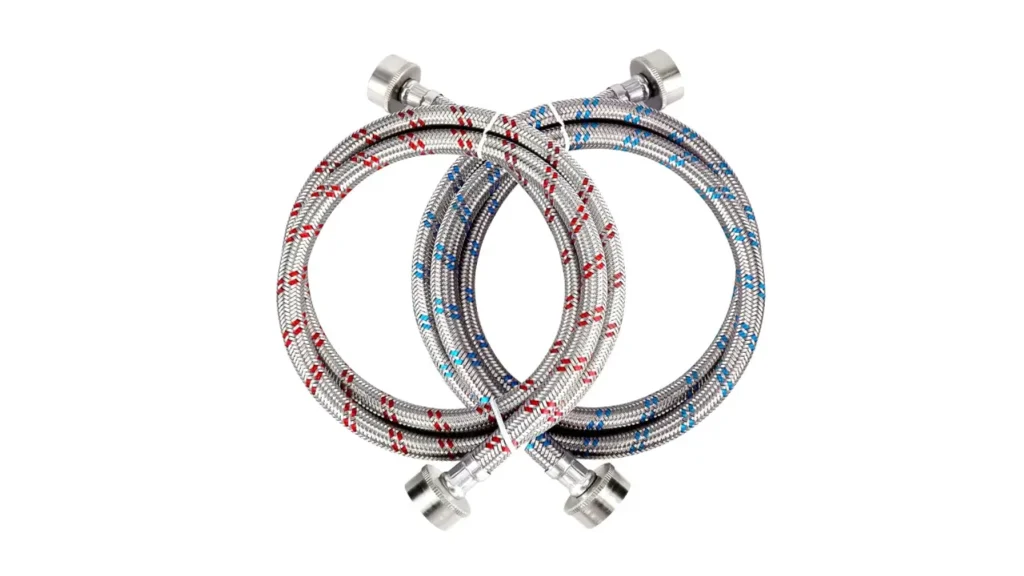
Stainless steel washer hoses are durable hoses designed to connect washing machines to water supply lines. Made with a braided stainless steel exterior over a flexible inner core, they provide superior strength, corrosion resistance, and long-lasting performance, ensuring reliable water flow and protection against leaks or bursts.
- Strong and Durable – Stainless steel washer hoses feature a braided metal exterior that resists cracking, splitting, and wear. We design them to handle higher pressure and provide long-term durability, ensuring safety and reducing the risk of water damage in your laundry area.
- Corrosion and Rust Resistant – These hoses are highly resistant to rust, corrosion, and mineral buildup. We use quality stainless steel to ensure that the hoses maintain performance and appearance over time, even in humid or hard-water environments.
- Enhanced Safety and Leak Protection – Stainless steel hoses are designed to prevent kinks and bursting. We reinforce each hose to provide reliable water flow and minimize the risk of leaks, giving homeowners peace of mind for long-term use.
- Longer Lifespan – Stainless steel hoses generally last longer than rubber hoses. We manufacture them to withstand wear, high pressure, and frequent use, offering a cost-effective, low-maintenance solution that reduces replacement frequency and improves overall reliability.
Rubber vs Stainless Steel Washer Hose
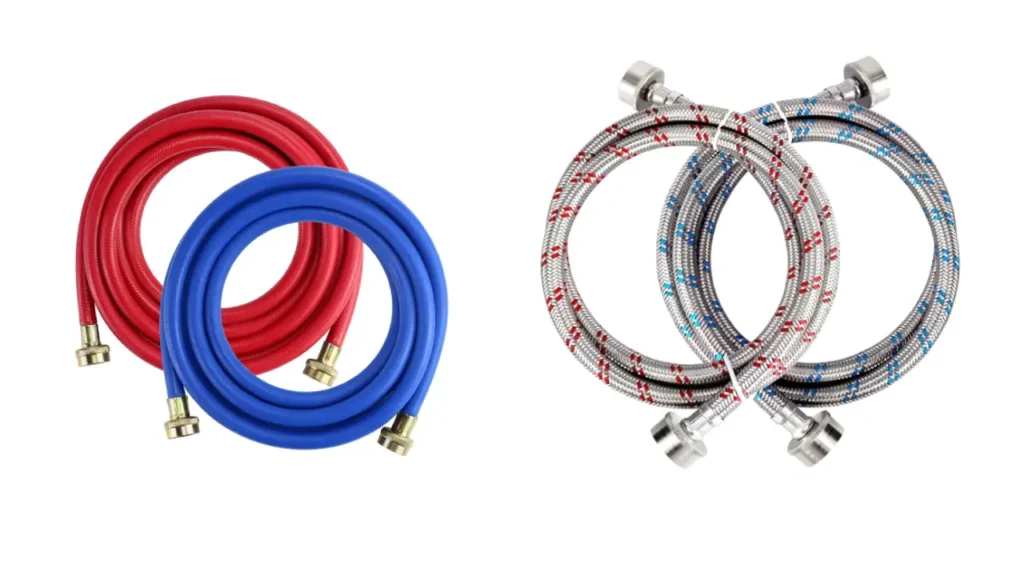
Rubber and stainless steel washer hoses serve the same purpose but differ in material, durability, and performance. Understanding their strengths and weaknesses helps you choose the right hose for your washing machine, ensuring safety, longevity, and reliable water flow in your home.
1. Material and Construction
Rubber hoses are made from flexible, high-quality rubber that allows easy bending and installation in tight spaces. They are lightweight and simple to handle, making them convenient for everyday household use.
Stainless steel hoses feature a braided metal exterior over a flexible inner core. This construction provides superior strength, resistance to wear, and protection against punctures, making them ideal for long-term use and high-pressure environments.
2. Durability and Lifespan
Rubber hoses are durable under normal household conditions but can degrade over time due to heat, pressure, or chemical exposure. Regular inspection and replacement are recommended to prevent leaks or bursts.
Stainless steel hoses offer extended durability, resisting cracks, kinks, and damage from environmental factors. They generally last longer than rubber hoses, reducing maintenance frequency and providing reliable water flow for years.
3. Flexibility and Handling
Rubber hoses are highly flexible, making them easy to coil, bend, and install in limited spaces. Their softness allows convenient maneuvering around obstacles, making installation quick and user-friendly.
Stainless steel hoses are less flexible due to the metal braiding, requiring slightly more effort to bend. However, they maintain shape better and resist kinking, providing consistent water flow without obstructions.
4. Resistance to Corrosion and Chemicals
Rubber hoses are prone to damage from prolonged exposure to water, detergents, or chemicals, which can weaken the material over time. Proper care and timely replacement are essential to maintain performance.
Stainless steel hoses resist rust, corrosion, and chemical damage, making them suitable for hard water or humid environments. They maintain integrity under various conditions, ensuring long-lasting and safe operation.
5. Cost and Value
Rubber hoses are generally more affordable, providing a cost-effective solution for short-term or standard household use. They are easy to replace but may require more frequent updates.
Stainless steel hoses have a higher upfront cost but offer long-term value due to their durability, resistance to leaks, and extended lifespan. They are an investment that reduces maintenance and replacement expenses over time.
| Aspect | Rubber Washer Hose | Stainless Steel Washer Hose |
|---|---|---|
| Material | Flexible rubber | Braided stainless steel |
| Durability | Moderate, may crack over time | High, resists wear and damage |
| Flexibility | Highly flexible | Less flexible but kink-resistant |
| Corrosion Resistance | Low to moderate | Excellent, resists rust and chemicals |
| Cost | Lower, budget-friendly | Higher, long-term value |
Are Stainless Steel Hoses Better Than Rubber?
Stainless steel hoses and rubber hoses serve different purposes in industrial and household applications. Choosing between them depends on durability, flexibility, temperature tolerance, and cost. Each type offers unique advantages, and understanding these differences helps select the right hose for safety, efficiency, and long-term performance.
- Durability and Strength: Stainless steel hoses are highly resistant to wear, punctures, and corrosion, making them ideal for harsh environments, while rubber hoses are more prone to cracking, tearing, and chemical damage over time, often requiring frequent replacements in demanding applications.
- Flexibility and Handling: Rubber hoses are lightweight and highly flexible, making them easy to maneuver in tight spaces or around corners, whereas stainless steel hoses, though less flexible, maintain shape under pressure and are more stable when handling high-pressure fluids, reducing kinks and leaks.
- Temperature Resistance: Stainless steel hoses withstand extreme temperatures, both hot and cold, without degrading, whereas rubber hoses have lower thermal tolerance, softening in heat or becoming brittle in freezing conditions, which limits their use in temperature-sensitive environments.
- Chemical and Corrosion Resistance: Stainless steel hoses resist most chemicals, acids, and corrosion, greatly extending lifespan, while rubber hoses may degrade when exposed to harsh chemicals or UV light, making them less reliable for certain industrial or outdoor applications.
- Cost and Maintenance: Rubber hoses are generally less expensive upfront and easier to replace, whereas stainless steel hoses involve higher initial costs but require less maintenance, offering better long-term value in industrial, high-pressure, or corrosive environments.
How to Choose Rubber and Stainless Steel Washer Hoses?
Choosing the right washer hose is essential for safety, durability, and optimal performance. Both rubber and stainless steel hoses have unique advantages, and selecting the best option depends on your household needs, water pressure, installation environment, and budget. Making the right choice ensures long-lasting, leak-free operation.
- Assess Water Pressure – Evaluate your home’s water pressure before choosing a hose. We recommend rubber hoses for standard pressure, while stainless steel hoses are better for high-pressure systems, as they withstand stress without bursting, ensuring consistent water flow and preventing potential damage.
- Consider Durability Needs – Determine how long you want the hose to last. We suggest stainless steel hoses for long-term durability and resistance to kinks or corrosion, while rubber hoses are suitable for short-term or budget-friendly applications that require flexibility and ease of handling.
- Check Installation Space – Consider the available space behind your washing machine. Rubber hoses are highly flexible and easy to coil, making installation in tight areas simple. Stainless steel hoses may require careful bending but offer superior kink-resistance and stability once installed.
- Evaluate Environmental Conditions – Assess exposure to heat, humidity, or corrosive elements. We recommend stainless steel hoses in areas prone to rust or chemical exposure, while rubber hoses perform well in standard indoor environments with minimal risk of degradation over time.
- Factor in Budget and Maintenance – Determine your budget and willingness for maintenance. Rubber hoses are cost-effective but may need replacement sooner. Stainless steel hoses cost more initially but reduce long-term maintenance and replacement needs, offering a more reliable, worry-free solution.
Conclusion
In summary, rubber washer hoses provide flexibility and ease of installation, making them suitable for everyday household use. Stainless steel hoses, on the other hand, offer enhanced durability, resistance to corrosion, and longer service life, making them ideal for more demanding applications or areas prone to high water pressure.
When deciding between rubber and stainless steel hoses, consider factors such as installation environment, expected lifespan, and maintenance requirements. Rubber hoses are cost-effective and user-friendly, while stainless steel hoses provide superior protection and reliability, ensuring peace of mind against leaks and damage.
For those looking for high-quality, wholesale rubber hoses, Kingdaflex offers a wide selection of durable, reliable options. Our hoses are crafted to meet industrial and household standards, delivering flexibility, long-lasting performance, and excellent resistance to wear, making them the trusted choice for your washing machine and plumbing needs.


